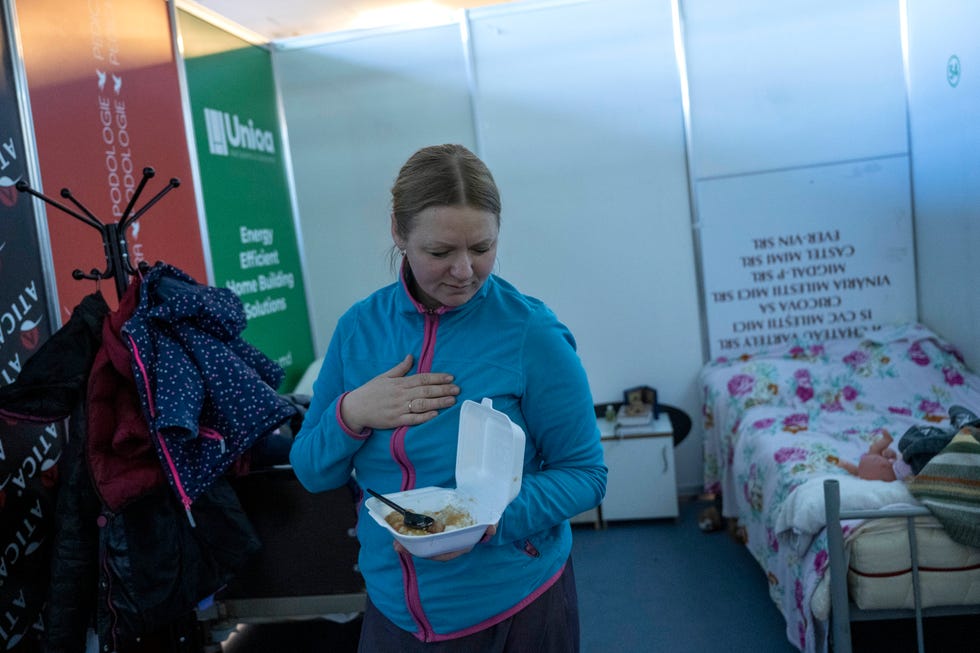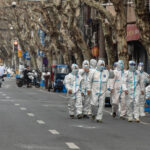This story was produced in partnership with the Pulitzer Center.
CHISINAU, Moldova – The hem of her purple skirt brushed the tile floor as Kristina Paleshev anxiously paced while cradling her wailing infant daughter Maria.
Sitting at a table with aid workers, forms and documents spread before him, her husband, Oleksandr, once again explained what had happened: The Russian artillery shelling that killed their neighbor. The heartbreaking decision to abandon their home in Mykolaiv. The frightening eight-hour drive across western Ukraine to the Moldovan border. The car breakdown just as they arrived in Chisinau, the Moldovan capital. Their five kids who awake startled during the night at any loud noise, frightened they’re again under attack.
“We want to go back. I love my country and my town,” Paleshev, 38, said, as a tear rolled down her cheek. “I’m crying because our people are being killed.”
Paleshev, her husband and their kids are among the 3 million refugees who have fled Ukraine since Russia’s Feb. 24 invasion. While most refugees, especially those from the Kyiv area, have flowed to Poland, an estimated 350,000 have entered Moldova, one of Europe’s poorest countries.
Most of the evacuees are women and children, as most men of fighting age have been ordered to stay behind to defend their country. Now, government workers and aid groups trying to help are conducting a hurried symphony across multiple languages, from Russian and Romanian, which is spoken in Moldova, to French and English. They’re fingerprinting and photographing refugees, double-checking documents, and providing emergency cash to the most needy.
Paleshev said her kids are still having nightmares.
“They cry at night, even now,” Paleshev said. “Every noise they hear makes them afraid. They cannot believe there is no war in this country. They just want to be safe.”
And although the flow of refugees across the Moldovan border had dropped from tens of thousands a day to around 2,000 now, according to aid groups, there’s no end in sight as Russian forces escalate their assault and target civilian areas.
Paleshev’s family fled with little more than the clothes on their back, daughter Maria wearing the same insulated snow pants three days later. They remembered to grab documents and a few toys, and drove nearly nonstop past Odesa and along the Ukrainian coast, crossing the border the day before.
“In three weeks we’ve had 3 million people displaced and we don’t know when this will stop,” said Kisut Gebreegziabher, a spokesman for the United Nations High Commission on Refugees.
The heavy flow of refugees into Moldova – even though about two-thirds of them have passed through on their way to other European Union nations – is raising concerns across the small country, which is only slightly larger than the state of Maryland and has fewer residents than Kansas. Moldova is spending upwards of $4 million daily on refugee services, according to some estimates. Its per-capita household income is $2,145 annually, compared to $33,700 in the United States.
More:Millions of refugees are fleeing Ukraine. Where are they going?
Congress last week approved $13.6 billion in Ukraine-related aid, including $6.7 billion for refugee assistance and economic aid to countries including Poland and Moldova, but the money has not yet begun flowing. In the interim, U.S.-based aid groups like Catholic Relief Services and Samaritan’s Purse are filling the gaps.
Margot Durin, a CRS program manager, said Moldovans are worried the influx of refugees could overwhelm their country. She said the vast majority of refugees are stopping over in Moldova as they flee southern Ukraine, proverbially catching their breath in a safe place before heading west to European Union countries offering residence and work permits.
Sitting in her temporary office, borrowed from Moldovan immigration offices, Durin helped local volunteers and U.N. staff register Ukrainian evacuees for housing and transportation. Many Moldovans in the Chisinau area have opened their homes to refugees.
“The solidarity the Moldovans are showing with the refugees is amazing,” Durin said.
Moldovans offer shelter to refugees
Like a Pied Piper, Dr. Gilad Gassner weaved through a refugee shelter in the center of Chisinau, handing out plastic medals and party horns to kids with few toys of their own. Hundreds of refugees are staying in temporary shelters across the city, including this one at the main convention center, which had been operating as a COVID-19 treatment site.
Within minutes of his journey, the honking and buzzing of the kazoo-like party favors echoed around the building, giving the shelter the feeling of a child’s birthday party, as clowns in masks and costumes sang songs, made balloon animals and blew soap bubbles, setting some refugees’ dogs barking.
Anya Guzhiyenko smiled as her son, Sasha, 4, shook a giant slinky toy and clashed balloon swords with another refugee. Guzhiyenko and her son fled Mykolaiv, arriving the previous night. Mykolaiv, which is near Odesa, has been heavily bombed by Russian forces, and there are reports that dozens of people have been killed.
“It’s good here,” Guzhiyenko said via a translation app. “We feel safe.”
More:Full of stoicism and unspoken fear, Ukrainian men steel for battle as they say goodbye to families
A pediatrician from Israel, Gassner and a volunteer team of doctors and medics flew to Moldova a few days prior, working with the national government to get emergency certification to practice.
Inside the shelter, Gassner said the distractions were deliberate: The families are suffering from ailments ranging from generalized anxiety to constipation caused by long bus journeys in which there wasn’t time to stop for toilet breaks. The team handed out everything from blood-pressure medication to antacids and ibuprofen, and referred people with greater needs to local hospitals and dentists.
“They haven’t slept. They’re in great stress from things they saw back home, and they don’t know the future,” Gassner said.
Psychiatrist Rachel Gissan, 41, who works with Gassner, said many of the refugees just need to feel heard and are empowered by telling their escape stories.
“People are having a normal response to an abnormal situation,” she said. “People don’t want to be labeled as sick. They want to move on, they need to function. So they have this facade and they keep on going. Even if their child is coughing and they have high blood pressure, people won’t come to us for help. We have to go ask them.”
More:Jimmy Hill, American killed in Ukraine, was ‘true to his love’ and stayed with sick partner
‘We just need time’
Standing in the weak March afternoon sun outside the shelter, Oleksander Paleshev raised a whistle to his lips and blew, signaling kids Ivan, Nicolay, Irina and namesake Oleksander to gather back around as Kristina walked up carrying little Marina. Kristina still had on her purple skirt and Marina was still wearing her snow pants, but both smiled.
After visiting the processing center the previous night, Kristina and Oleksander decided to try their luck in the United Kingdom, which is offering work permission to refugees. Before her kids were born, Kristina was a web designer, and she remembers fondly the English people she worked with.
The family decided to sell or abandon their broken car – it is at a nearby mechanic awaiting parts – and fly to London with Kristina’s sister and her family, who convoyed out of Mykolaiv with them. A day before, she’d tearfully longed to return home. Now, she’s hopeful for a fresh start but isn’t sure how soon they will leave.
Meanwhile, the family of seven is sharing four single beds in a 10-by-24 foot partitioned space in the convention center-turned-refugee site. The kids haven’t been sleeping well. They normally go to bed at 8 p.m., but the noisy shelter means they don’t get to sleep until about 10 p.m., she said.
Still, the thought of a better life away from the terror of the Russian attack has her feeling optimistic. Although they’ve left behind their house and all their belongings, the family is together. That’s what matters, she said.
“Every day is better, every next day is better. I’m hopeful,” she said. “The kids are happy. Everything will be good, I think. We just need time.”
More:
Lindsey Graham called for Putin’s assassination. Even discussing it brings danger to US, experts say.
Putin war crimes in Ukraine will be investigated, but Russian leaders unlikely to be prosecuted
Biden warns Xi of supporting Russia as US-China relations face ‘crossroads’ over Ukraine invasion




